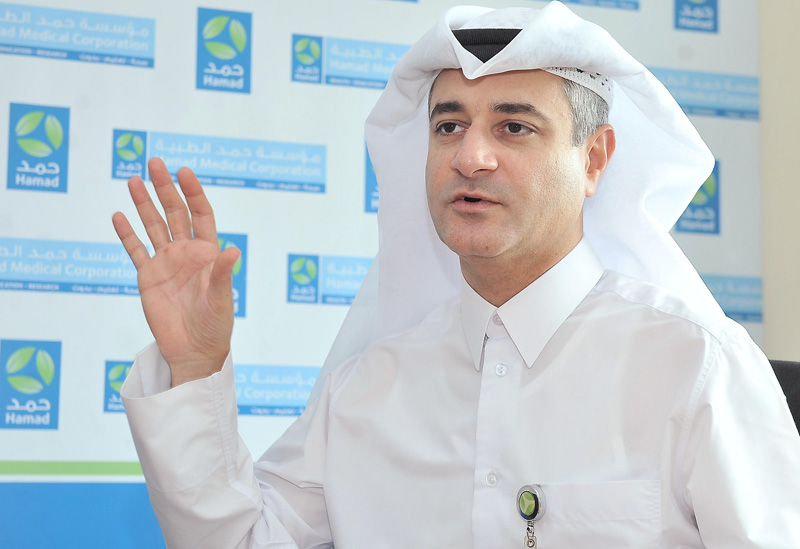
Hamad Medical Corporation (HMC)’s Ambulance Service is providing the safe and most effective service regarding transportation of patients during the spread of COVID-19.
The Ambulance Service with experience in dealing with infectious diseases has introduced some new protective measures due to the nature of COVID-19, said Ali Darwish, Assistant Executive Director, Ambulance Service at HMC.

“We understand that the nature of COVID-19 is slightly different from the other communicable disease like MERS or SARS. But in Qatar the paramedics are well trained to deal with the present situation. With the COVID-19, we took information from the Minister of Public Health and the Communicable Disease Center and have set guidelines for the Ambulance Service,” Ali Darwish told The Peninsula.
One of the major steps taken by the Ambulance Service related to COVID-19 was to protect the paramedics and patients by providing personal protective equipment, following decontamination measures and set a schedule for smooth transportation of patients.
“The first step we took was to split the field operation from the office operation for safety of the staff. We have also formed a virtual office and we hold meetings with the help of technology. So it doesn’t affect regular operations and we keep everyone updated about day-to-day activity. This has helped us to remain the flow of usual business and cope with COVID-19 situation,” said Ali Darwish.
The Ambulance Service has seen an increase of 30 percent in daily activities. On average the Ambulance Service would receive 700 to 800 calls but now the number has increased to 1200. “We distribute the work across the ambulance service. Everyone has a task. We have a robust structure to ensure smooth operations,” said Darwish.
The Ambulance Service has also educated the paramedics and provided them with some minor training to deal with COVID-19 while handling, lifting movement and treatment of patients.
“We established a chain of communication where from the CEO to the paramedics are informed about every development. Separately, we have a System Wide Incident Command Center (SWICC), which doesn’t exist in normal situation. It is activated by the Minister of Public Health whenever we have a crisis situation. In SWICC we have a representative from every speciality in the health sector. They are connected 24 hours and help each other,” said Darwish.
“This helps transportation of COVID-19 patients across Qatar to the suitable and available healthcare facility depending on their condition, gender, age etc.,” he said.
Darwish also emphasized on the service provided at the Hamad International Airport as it is a very important place to transport people by the Ambulance Service.
“Hamad International Airport is a very important point of entry to the country. We have a good clinic and it is supervised by our mobile doctor service. We screen any person coming into Qatar, depending on the condition of the person, we decide either to transfer him/her to a health center, hospital or quarantine centre,” said Darwish. He also pointed out that Ambulance Service has designated service in the Industrial Area, which is under lockdown.
The Ambulance Service also transport people from and to quarantine facilities as well as to healthcare facilities.
“Even if a person is suspected to have COVID-19, we follow all precautionary and preventive measures same as we do for a COVID-19 patient. This we do for the safety of the public and paramedics,” said Darwish.
The Ambulance Service has also introduced a drive through facility at some HMC hospitals, some health centers and deployed mobile vehicles to screen people suspected to have COVID-19 or contact with a patient.
“The person will be sitting in the car and we do a quick registration and initial screening. This reduces people entering a health care facility,” said Darwish.
According to Darwish, 20 ambulances were assigned exclusively to transport COVID-19 patients and people suspected to have the disease. Also some buses are deployed to transport high number of people to quarantine and healthcare facilities.
“But due to the increase in demand, we still have our regular operation ambulance has been dispatched to transfer COVID-19 positive patients. But the message Ambulance Service would like to send to the community is that all ambulances are disinfected and safe to travel,” he added.
“Every ambulance which transports a COVID-19 patient undergoes a deep cleaning as instructed by the Communicable Disease Centre. All paramedics use a disposable personal protective equipment. After dispatching the patients, the paramedics will dispose the kits as medical waste,” he added. Darwish also said that all ambulances in Qatar are in high standards and equipped as well as suitable to transport patients with infectious disease.
“All ambulances in Qatar by design have the necessary standard to transport COVID-19 patients. And we have to only follow some safety guidelines provided by the Communicable Disease Centre,” he added.
Darwish also said that all COVID-19 patients and those suspected to have the disease or while transporting people to transport, the Ambulance Service provides the best patient care.
“Nothing has changed in patient care. The only thing we have added is personal protective equipment for the paramedics,” he said.
According to Darwish, the Ambulance Service also has the responsibility of decontaminating quarantine facilities. He also emphasized on the dedication of the Ambulance Service paramedics and other staff.
“All staffers at the Ambulance Service have the self-motivation to serve the country and people in this situation by being available to work at any given time and cancelling their leave,” he added.








